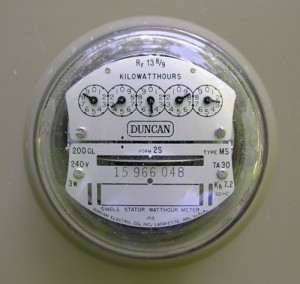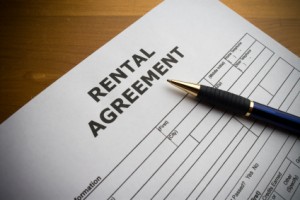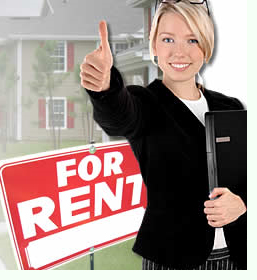Posted by Teresa on May 6, 2011 under Landlord and Tenant FAQs | 
 What is a landlord’s responsibility after a tenant notifies that he or she is breaking a lease early? Can landlords just allow a rental unit to sit empty, requiring the old tenant to continue paying rent until the end of the original lease?
What is a landlord’s responsibility after a tenant notifies that he or she is breaking a lease early? Can landlords just allow a rental unit to sit empty, requiring the old tenant to continue paying rent until the end of the original lease?
In a word, no. When a tenant breaches the terms of a lease, landlords are required to mitigate their losses by making a real attempt to fill the empty unit. Otherwise, apartments and rental houses everywhere would be sitting empty while tenants who need to move are paying rent at both their new and old places. Meanwhile, tenants who need homes to rent would be kept out of rentable units.
But how much effort is required of a landlord? If he or she makes an attempt to fill a rental unit, does that suffice? How far must a landlord go before requiring the former tenant to make up the loss in rent?
Here are two scenarios to illustrate typical landlord actions:
- Landlord A advertises a rental unit at above-market rates. In this case, it’s not the tenant’s fault when the listing doesn’t attract any new applicants. The landlord is increasing her chances of loss of rent by advertising the unit at above-market rents. It wouldn’t be fair to require the tenant to keep paying rent until someone willing to pay too much comes along.
- Landlord B advertises the rental unit at the same rent the tenant was paying and posts “For Rent” signs on the building. This landlord is showing a real effort to mitigate his losses. If no suitable tenants come forth, it is not the landlord’s fault, and therefore the tenant would likely be required to continue paying rent until the unit is leased.
Keeping rental units full at rates the market can bear is good for landlords ad tenants. So, when a tenant notifies you that they’re moving out ahead of the lease termination date, make every effort to fill that vacancy, and you’ll make three people happy—the old tenant, the new tenant and yourself!
Learn more about protecting your rental property and assets through tenant background checks. Proper tenant screening will ensure you are leasing to the best possible tenants.
Posted by Teresa on April 19, 2011 under Rents and Deposits | 
 In a perfect world, every tenant would pay their rent online a day or two in advance, so that the funds are automatically transferred into the landlord’s preferred bank account. In this fantasy world, no rent checks, money orders, mail issues or late payments would ever need to be dealt with. Landlords know this will never happen!
In a perfect world, every tenant would pay their rent online a day or two in advance, so that the funds are automatically transferred into the landlord’s preferred bank account. In this fantasy world, no rent checks, money orders, mail issues or late payments would ever need to be dealt with. Landlords know this will never happen!
In reality, tenants come with a wide assortment of likes, dislikes and financial challenges. Some refuse to keep a checking account (or can’t get a bank to open one). Others are not computer-savvy and will be unable to navigate an online rent payment system. Online payments may be difficult for the the elderly or disabled to deal with. Still other tenants just prefer to deal in cash.
Depending on your rental property and typical tenant, it might be unrealistic to demand that all tenants mail you a check or pay rent online. Making it easier for your tenants to pay their rent on time by offering options that work for everyone might take some effort—but it can pay off. Just make sure that it works for you, as well.
Some options to consider for tenant rent payments:
- Dropping off cash or money orders on-site: this is not a good idea, as it invites theft!
- Set up a rent-receiving bank account and distribute deposit slips to tenants: Indicate each name on the slip, and tenants make deposits directly to the account. The landlord can track deposits online, and usually view and print a copy of the deposit slip.
- Collect rent personally: Many landlords prefer to pick up rent payments themselves because it gives them a chance to check on the property and have some face-to-face tenant time. It can also prevent late payments, since the tenant either has to pay up or explain why they can’t. However, this can be dangerous—especially when cash is involved.
- Provide self-addressed envelopes: Whether you provide the stamps or not is up to you; many tenants find it easy to drop a money order or check in an envelope that is ready to go. It may seem like going too far to make things easier for the tenant, but if it helps your cash flow—why not?
- Direct deposit or electronic transfer: In this situation, the tenant agrees to automatic electronic transfer from their bank account to yours on a specific day of the month. Automatic bill pay is becoming the way people pay bills, so why not rent as well?
Creative rent payment solutions can help keep your tenants paying on time–and keep you in the black!
Posted by Teresa on April 6, 2011 under Lease and Rental Agreements | 
 The utilities section in a property lease is one of the most important. It stipulates who is responsible for the utility bills associated with the rental property. Failing to specify which utilities the tenant will be responsible for can cause headaches and financial loss to the landlord.
The utilities section in a property lease is one of the most important. It stipulates who is responsible for the utility bills associated with the rental property. Failing to specify which utilities the tenant will be responsible for can cause headaches and financial loss to the landlord.
Determining who’s responsible for the unit’s utilities—and having a signed agreement—is important because it protects both the landlord and the tenant. Each utility company has different ways of handling rental properties. Once you know how things work in your area, decide which arrangement works best for your situation; there are many options, including:
- In single-family rental houses, tenant pays all utilities directly to the provider
- Landlord pays for utilities that can result in liens against property if unpaid
- Tenant pays for everything except sewer and water
- Landlord pays utilities and has tenants reimburse him
- Landlord pays only for utilities the building owner is responsible for
- Tenants pay for anything that is metered to their unit; utilities with shared meters (usually water and sewer) are paid by landlord and built into the rent
- Landlord pays for garbage and recycling pickup only
Once you determine which arrangement works best, draft your this section of the rental agreement stating that the tenant is responsible for all utilities except for those (specify them) the owner will be paying. Also include language that the tenant agrees to make the payments through the term of the lease and nonpayment will be considered a breach of the agreement. State that any past due utility bills may be paid by the owner and will be charged to the resident, along with applicable fees.
As part of your due diligence before you sign the lease, check with the utility companies to be sure the tenant qualifies for an account in his or her name. Outstanding bills may prevent this—if you sign a lease with a tenant who cannot get the utilities in their name, you’ve just wasted a lot of time working with a tenant who won’t be moving into your rental property.
Finally, most landlords we know have utilities revert to their name between tenants.
Posted by Teresa on April 1, 2011 under Landlord and Tenant FAQs | 
 Question: A landlord accepts applications from three potential roommates for a three-bedroom rental unit. The first two check out fine. The third proves to be difficult and unpleasant, even borderline verbally abusive, in all her interactions with the landlord. He decides to not even order a tenant credit report and rejects all three applicants. Is the landlord allowed to refuse a tenant for reasons other than a credit score?
Question: A landlord accepts applications from three potential roommates for a three-bedroom rental unit. The first two check out fine. The third proves to be difficult and unpleasant, even borderline verbally abusive, in all her interactions with the landlord. He decides to not even order a tenant credit report and rejects all three applicants. Is the landlord allowed to refuse a tenant for reasons other than a credit score?
Answer: Of course. A landlord may decline an applicant for any reason other than those covered under the Fair Housing Act, which bars discrimination based on race, color, national origin, religion, sex, familial status (including children under the age of 18 living with parents or legal custodians), pregnant women, elderly people, people securing custody of children and handicap (disability).
A landlord does not have to disclose reasons for rejecting a tenant—you can simply say a more qualified applicant was approved. (Under the Fair Credit Reporting Act or FCRA, a letter must be sent to an applicant if credit is declined, including for rental housing)
Question: A landlord advertises a rental property using the following language:
For Rent. 3BR apartment, 3rd floor. Not suitable for kids or elderly.
Is this discriminatory?
Answer: Yes. See above: landlords may not deny housing based on family status or age. This landlord could get in big trouble for this type of ad.
Question: A landlord starts eviction proceedings after discovering a tenant has kept a cat in her apartment—contrary to the lease, which states no animals are allowed. The tenant tells the landlord that she needs the cat because it is a therapy animal. Is the landlord discriminating against the tenant based on a disability?
Answer: It often depends on where the rental property is located. In most areas, a tenant must provide proof that the therapy or companion animal is necessary for the individual’s mental health or stability. This is usually a statement by a medical provider. The Americans with Disabilities Act (ADA) does not include companion, emotional support or therapy animals, because they have not been trained to perform tasks that benefit a disabled person.
Posted by Teresa on March 22, 2011 under Landlord Paperwork and Forms | 
 Harry the landlord notices a broken window in Unit A during a routine maintenance visit to Unit B. He knocks on Unit A’s door to arrange a repair and is greeted by someone he’s never seen, much less approved to live there. The man asks Harry what he wants; Harry explains that he is the building owner. “Oh. I’m visiting,” the man replies.
Harry the landlord notices a broken window in Unit A during a routine maintenance visit to Unit B. He knocks on Unit A’s door to arrange a repair and is greeted by someone he’s never seen, much less approved to live there. The man asks Harry what he wants; Harry explains that he is the building owner. “Oh. I’m visiting,” the man replies.
Later, Harry asks the tenant in Unit B if she has seen the man in Unit A. “You mean Scott?” she answers. “He’s been there for a couple of months.”
There is a fine line between a visitor and an unauthorized resident. Explaining the difference to your tenants can be tough—but it’s something a landlord must do to avoid the risk and potential problems that come when unscreened and unauthorized tenants live in your rental property.
Luckily, making sure you’re legally covered is easy. Just make sure your lease specifies what tenants can and cannot do when it comes to guests.
Harry’s lease does prohibit unauthorized residents. When he brings this to Unit A’s attentions, the tenant replies that her friend is not a resident—he’s just visiting.
Harry reviewed his rental agreement and realized it didn’t specify any time limit for guests or visitors. He revised it to read:
“Persons other than those specifically listed on the Rental Agreement shall be strictly prohibited from staying in the rental unit for more than 7 consecutive days, or a total of 20 days in any 12-month period. Tenant shall notify Owner in writing any time the Tenant expects any guest will be staying in excess of the time limits herein. Additional residents will be subject to full screening procedures, additional rent and security deposit. Unauthorized residents are a violation of this Rental Agreement and grounds for termination of the Rental Agreement.”
Harry was still within his rights to notify the tenant in Unit A that her unauthorized guest had overstayed his welcome and that he would need to move or she would be in violation of her lease. Luckily, she didn’t push the issue and the visitor was soon gone.
Don’t expose your tenants or your business to the risks of unscreened residents. Require your tenants to clear it with you before allowing anyone to move in. Require the new roommate to fill out a lease application and undergo tenant screening and a background check before they unpack their first box of belongings!
Posted by Teresa on December 23, 2010 under Housing Trends, Landlord Paperwork and Forms, Tenant Credit Checks | 
 Short-term leases are becoming more popular in some areas of the country. One trend is that homeowners who sell a home are less willing to buy right away, so while they wait and see what the market will bring, they rent for a while. Another factor is the toll the economic crisis took on renters’ credit scores. Landlords are less willing to take chances on one-year leases, so often a month-to month or six-month lease is a great option.
Short-term leases are becoming more popular in some areas of the country. One trend is that homeowners who sell a home are less willing to buy right away, so while they wait and see what the market will bring, they rent for a while. Another factor is the toll the economic crisis took on renters’ credit scores. Landlords are less willing to take chances on one-year leases, so often a month-to month or six-month lease is a great option.
When the economy and job market are both doing well, the ideal situation for a landlord is a one-year lease with a strong tenant. But even though the rental markets across the country are starting to show improvement, many landlords are far from the ideal—and they still need to fill rental units.
When credit scores are less than perfect, and home sellers are knocking on your door, looking for short-term leases, it makes sense to adjust your lease terms from one-year to six-month or month-to-month.
Month-to-month leases mean that at the end of any month, the tenant can simply move—or the landlord can end the lease. Most leases require notice on each side, but if neither side ends the lease, it continues for another month.
7 Advantages of Short-term Leases:
- Your rental units could be occupied instead of empty
- Improved cash flow
- Possibility of higher rent negotiation
- Easier transition between tenants (less clean-up and maintenance)
- Larger pool of possible tenants
- You can get rid of a bad tenant more quickly
- For month-to-month leases, the rent can be adjusted at any time
Remember, no matter what the length of the lease, proper tenant screening is the most important step you can take prior to signing it. Conduct a thorough tenant credit check and background check and you’ll feel better about offering a lease to short-term tenants.
Posted by Teresa on November 30, 2010 under Landlord and Tenant FAQs, Landlord Paperwork and Forms | 
 Many landlords we hear from believe that a thorough, well-written and lawyer-approved lease should contain all the rules and regulations a tenant needs to follow. And that’s partly true. But there’s a difference between the terms of a lease and the everyday policies you want your tenants to follow.
Many landlords we hear from believe that a thorough, well-written and lawyer-approved lease should contain all the rules and regulations a tenant needs to follow. And that’s partly true. But there’s a difference between the terms of a lease and the everyday policies you want your tenants to follow.
As a rule, leases are where the legalese lives: the legal description of the property, legal names of the parties involved, legal termininology, and the landlord’s legal recourse when terms are not followed. The “house rules” are generally more relaxed in language, are more flexible (i.e., they can change at any time with notice to all residents) and are simply intended to help everyone get along better and live in harmony. They are generally not legally-enforceable documents.
A signature on your list of policies or house rules is just as important as the signature on the lease. You want to be clear that your tenant understands the rules and agrees to abide by them. Review them together at the time of the lease signing, and be sure to ask if any item needs clarification.
10 Items to Include in Your Rental Property Rules
- Noise: Emphasize that consideration for other tenants is required, and that while your rental unit is well-constructed, it is not to be considered sound proof. Noises that disrupt others’ quiet enjoyment are not allowed. Include quiet hours, if desired.
- Window Treatments: Here you’ll include whether or not blinds or drapes are included with the rental unit and what care they require. If no treatments are provided, you may want to specify what color and type of coverings are allowed—and what are not allowed (like aluminum foil).
- Keys: Any key replacement fee should be included here, as well as emergency lock-out fees if a tenant forgets his or her keys after hours.
- Inclement Weather Procedures: Inform tenants of your requests during times of high winds, low temperatures, or high rain, as well as thermostat settings when the rental unit is occupied for specified lengths of time.
- Trash and Recycling: Tenants need to know what can be recycled and where it goes, along with non-recyclable trash.
- Parking: Where tenants are allowed to park, how many vehicles each unit is allowed to keep onsite, where not to park, and whether or not non-running vehicles are allowed are some of the rules you’ll want to spell out here.
- Common Areas: Are tenants allowed to leave property in common areas like hallways, sidewalks and patios? Who is responsible for clearing snow and ice from walkways? Spell these things out here.
- Storage: Indicate where tenant storage is located, how they can access it, and any limitations (flammables, vehicles, dangerous chemicals, etc).
- Guests: Include things like where guests may park their vehicles and tenants’ responsibilities for their guests.
- Bicycle Parking: As bicycle commuting becomes more popular, many tenants will want to know where they can park their bikes. If you don’t want them chained to fences or balcony railings, specify where bike parking is allowed. Better yet, create special areas for bikes that are convenient and secure for cycling tenants.
Presenting a friendly list of house rules lets all tenants know what is expected of them and their fellow tenants. After all, who (besides fraternity kids, perhaps) wants to live in a place where there are no rules?
Posted by Teresa on October 12, 2010 under Landlord Tips | 
 Landlords who have been at the business for a while know that relationships with tenants can be smooth and easy, or rough and rocky, depending on a number of factors. Often, it’s the tenants themselves—they can be trying! But sometimes, one of the factors is the landlord.
Landlords who have been at the business for a while know that relationships with tenants can be smooth and easy, or rough and rocky, depending on a number of factors. Often, it’s the tenants themselves—they can be trying! But sometimes, one of the factors is the landlord.
Rental property investing and management is a tough business, and being a pushover is quick path to disaster. Many landlords we talk to say it’s a fact that tenants can be “trained” to follow the rules and requirements of their leases. This is not to say that tenants are like puppies, or aren’t people who deserve respect—of course they do! It’s more of way of encouraging good behavior and enforcing consequences for breaking the terms of a lease. When landlords fail at this, they are in for a rough and rocky tenant relationship.
How to Train Tenants in 3 Easy Steps
- Communicate clearly—and often. It’s not enough to sign a lease with a new tenant and then go away. Need a question answered? Ask it. Is the rent late? Call, text or email the tenant. Concerned about the number of cars they’re parking on your property? Knock on the door and talk to them. Ignoring a problem will not make it go away. Establishing communication is the first step to developing a good relationship with your tenants.
- Clarify expectations. Most tenants are not mind readers. If you are not clear on your expectations, don’t blame your tenants for not fulfilling them. If rent is due on the 1st and considered late on the 5th, spell out what that means on the lease. Will the eviction notice go up on the 5th? Or will you just charge a late fee? If so, how much? And by “due on the first,” do you mean in your hand? In your bank account? Or postmarked on the first? If a unit is “non-smoking,” does that mean no smoking inside? What about outside on the deck? Or in the hallway or lobby? If residents are expected to smoke in certain areas only, then clarify it on a layout of the property.
- Be firm. For many landlords, this is a problem. For many others, being firm comes naturally. Remember, this is not just to keep tenants following your rules. It’s a matter of fairness. For example, if you allow the single mothers, but not male tenants, to move in without a security deposit, you risk a discrimination charge based on gender. If you ignore one tenant’s yappy dog, but don’t allow her neighbor to have a cat, you’re going to have problems. Know your rules, apply them to every tenant equally, and don’t back down when a tenant asks for leniency.
Training your tenants simply means that you require certain behavior from all who lease your property. When you allow tenants to bend or break your rules and requirements, they are training you on how it’s going to be. And that’s no way to run a rental property business!
Posted by Teresa on October 8, 2010 under Landlord Tenant Lawsuits, Landlord Tips | 
 Surprise! You Must Return the Tenant’s Security Deposit: When a tenant moves out and leaves significant damage to the rental unit, why wouldn’t you be able to just keep the entire security deposit to clean up and make repairs? Isn’t that the purpose of a security deposit? Yes, as long as the landlord or property management company follows the letter of the law. When they do not, the tenant can keep every penny of the deposit and walk away, leaving the property owner or manager to deal with stained carpet, water damage, wall gouges and broken cabinet doors.
Surprise! You Must Return the Tenant’s Security Deposit: When a tenant moves out and leaves significant damage to the rental unit, why wouldn’t you be able to just keep the entire security deposit to clean up and make repairs? Isn’t that the purpose of a security deposit? Yes, as long as the landlord or property management company follows the letter of the law. When they do not, the tenant can keep every penny of the deposit and walk away, leaving the property owner or manager to deal with stained carpet, water damage, wall gouges and broken cabinet doors.
While tenant screening helps reduce liabilities like renting to tenants who trash properties, anything can happen. Remember, if the law in your state requires landlords and property management companies to return security deposits or provide an itemized list of damages within 15 or 30 days (most do) and you fail to provide it, the tenant may seek recourse, including return of the security deposit, no matter how much damage he or she has left behind.
Surprise! Your Tenant is the Proud Owner of a Pit Bull Puppy: Whether your rental property is a pet-friendly one or not, most insurance companies will not cover a property where certain dog breeds live—and most include pit bulls on the list of prohibited breeds. Of course, your lease should state clearly the policy on pets. When a tenant sneaks in two cats above the one you approved, blatantly ignores your “no snakes” rule, or thinks your “no pit bulls” rule applies to another tenant, then you are within your rights and responsibility to give notice to remove the animal(s) or face eviction.
Remember, tenants don’t always read their leases. When signing a lease with a new tenant, read over each and every paragraph and make sure they understand the consequences of breaking any of the provisions of the lease. If you review a “no pets” policy with a new tenant, inform them that they will be evicted if they bring a pet into the rental unit, then moving forward with eviction is the only recourse. Other tenants will see you enforce the rules.
Surprise! Tenants are Your Customers: Keep your tenants happy by respecting their right to live quietly and enjoy a home where everything functions properly. Keep your tenants safe by installing adequate lighting and locks. Keep your tenants satisfied by giving plenty of notice when you need access to their rental unit. Help them carry the couch in on moving day. Be proactive when making routine repairs and keep everything well-maintained. You’ll be surprised how many more referrals you’ll receive when your tenants are happy.
Remember, you’re in a business where you have a product (your rental property) and a service (your management of said property) to sell, and a customer who needs them. Your tenants are your customers, and good customer service will go a long way to making the landlord/tenant relationship a more successful one.
Posted by Teresa on October 6, 2010 under Landlord Paperwork and Forms, Landlord Tips | 
 Common gripes between landlords and tenants can often be prevented through clear communication. And by “clear,” we mean “absolutely, crystal clear.” Murky, misunderstood or meaningless agreements almost never work in the rental property business.
Common gripes between landlords and tenants can often be prevented through clear communication. And by “clear,” we mean “absolutely, crystal clear.” Murky, misunderstood or meaningless agreements almost never work in the rental property business.
Four simple steps to clear communication:
- Say exactly what you mean.
- Put it in writing.
- Make sure the tenant understands.
- Get the tenant’s buy-in.
Say exactly what you mean: If you require pet deposits for the privilege of housing a pet in your rental property, specify if they are refundable with no damages or non-refundable and not intended to cover damages. The vague term “pet deposit” could be interpreted to mean “refundable if my pet does no damage.” The day a pet-owning tenant moves out and expects that deposit back is not the time to explain that you really meant it’s non-refundable, damage or no damage.
Put it in writing: We’re not lawyers, and of course you should always consult with yours before proceeding along the path to any agreement, but do remember that when it comes to landlords and tenants, the “he said, she said” argument rarely wins over a signed, dated agreement. When it comes to the landlord business, the more signatures, lists, photos and pieces of paper you have, the better.
Make sure the tenant understands: Never assume a tenant knows what you’re talking about. This doesn’t mean you should patronize or talk down to a tenant—or treat them like they’re in kindergarten. It does mean to take the time to explain every detail of the lease agreement, tenant rules, pet policy, causes for eviction, quiet hours and even appliance operation. Whatever it takes to establish a respectful, mutually agreeable relationship in the beginning will pay off through the time of the lease. It takes time and effort to look a tenant in the eye, ask if they understand, explain if they don’t, and obtain a signature saying they do. But it can save a lot of hassle down the road.
Get the tenant’s buy-in: Don’t dictate to your tenants. Help them understand that every rule, every procedure, and every effort on your part is to make their rental home a place they and their neighbors want to live. Ask for their cooperation in making it so.
Sounds simple, right? As with anything that’s worth doing, establishing clear communication with tenants may take time and practice. But it can’t hurt to try and see if it makes the landlord/tenant relationship a little smoother and more pleasant!
 What is a landlord’s responsibility after a tenant notifies that he or she is breaking a lease early? Can landlords just allow a rental unit to sit empty, requiring the old tenant to continue paying rent until the end of the original lease?
What is a landlord’s responsibility after a tenant notifies that he or she is breaking a lease early? Can landlords just allow a rental unit to sit empty, requiring the old tenant to continue paying rent until the end of the original lease?








